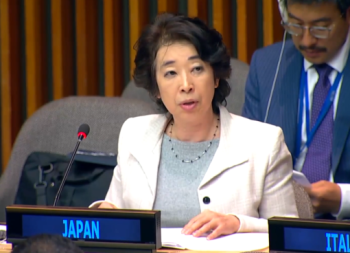Statement by H.E. Ambassador SHINO Mitsuko, Deputy Permanent Representative of Japan to the United Nations, at the Joint Meeting of the Economic and Social Council and the Peacebuilding Commission on the Development and Peace Dimensions of Forced Displacement: Countries’ Best Practices in Creating Durable Solutions
2024/7/1

(as delivered)
I thank the President of the ECOSOC and the Chair of the PBC, for convening this meeting. I also thank the briefers for their important inputs.
As the number of forcibly displaced people exceeds 114 million, relying solely on emergency humanitarian assistance is insufficient. A comprehensive approach – whole of society approach – is crucial to tackle the intertwined root causes of forced displacement, not only to alleviate the vulnerable situation that people face in the short term but also to help prevent any future displacement by adopting a long-term perspective. I cannot agree more with Mr. Piper; we need lasting solutions.
Since President and Chair are both from the Latin America region, I am pleased to introduce Guatemala as an example where Japan provided assistance to returning migrants by strengthening the capacity of host communities and offering vocational training and entrepreneurship education to youth, in cooperation with IOM. Education is the means of empowering people. It is so true. The Humanitarian-Development-Peace (HDP) nexus approach has contributed to promoting the socio-economic reintegration of returned migrants, boosting economic revitalization and job opportunities in Guatemala, and preventing potential migration due to poverty and socio-economic difficulties. Ms. Blanco said, “Peace means more than ceasing the conflict.” If people find job to spend dignified life at home, they don’t need to leave home. On the contrary, if they don’t have nothing to lose and more, they will risk everything. Here, I would also like to highlight the importance of a human-centered, human security-based approach in tackling the issue of forced displacement, as this contributes to improving individual self-reliance and allowing people to be agents of making their society resilient to both existing and new threats.
ECOSOC can make greater use of the PBC’s advisory, bridging and convening role to help the two bodies collaboratively promote more effective and efficient UN support in addressing and preventing forced displacement. When ECOSOC detects any concerns or early warning signs through its activities, the PBC can provide support, if the State concerned wishes, and be a venue for convening different stakeholders, including civil society, regional organizations, UN entities, and potential donors. This provides impetus for these stakeholders to together pursue possible political accomplishment, technical and financial support to address the challenges.
I would like to add one thing. You may think Japan is a lucky country which doesn’t know the challenges of displacement. No. Maybe in a different way, but we do face displacement due to earthquakes and other natural disasters. We do understand the plight and despair of the displaced person.
Therefore, but not only because of, Japan stands ready to contribute to share our experiences and discuss on enhancing cooperation as a member of both the ECOSOC and the PBC.
Muchas gracias.
